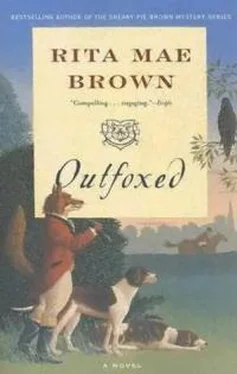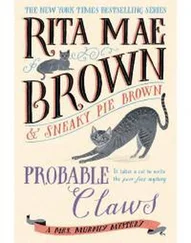“Did I get the date wrong? Were we supposed to have dinner tonight?” Martha hastily reached for her daybook.
“No, no, I was dropping off fixture cards at the post office and I don’t know . . . drove by and saw the light on.” He smiled.
“We’re trying to come up with something English but not too rigid for the Haslips’ new garden. See.” She pointed to designs.
A moment of silence followed. “We might as well start fresh in the morning,” Fontaine said warmly to Martha.
“Fine.”
“A nightcap?” Crawford asked hopefully.
“Sure,” she replied, a quiet look of happiness on her face.
This infuriated Fontaine, who rolled a second set of plans, popping them into a heavy cardboard tube. Half sounding playful and half in warning he said, “Watch out for him, Martha.”
Crawford, face suddenly bright red, replied through clenched teeth, “This is no affair of yours.”
“You were a damn fool to let her go in the first place. If I weren’t married, I would have asked her out myself.”
“Since when has that stopped you!”
Fontaine gave his reply, a straight right to the jaw. Crawford, not being a boxing man, crumpled.
Martha knelt down as he shook his head, then scrambled up. He did not offer to return the blow. Crawford recognized his physical limitations. He was four inches shorter than Fontaine and about ten years older. No amount of elective surgery could turn back the clock.
“Come on, Crawford.” She tried to move him toward the door.
He held his jaw with his hand. Hurt like hell but he managed to hiss, “I’ll dance on your grave!”
CHAPTER 28
Bridles, broken down, stripped, and dipped, hung overhead on tack hooks, which resembled grappling hooks. Underneath, a plastic bucket caught the dripping oil.
Sister and Doug sat on low three-legged stools, buckets of clear rinse water and buckets of washing water between their feet. With a toothbrush in hand they scrubbed each steel bit until it shone. They ran their fingers over the bits, searching for pitting. Korean steel bits pitted quickly. They weren’t worth the money paid for them. German bits were good but nothing compared to English steel. The English from the nineteenth century onward excelled in creating a smooth, perfectly balanced bit with superior steel, no cheap alloys. The expense, initially steep, panned out over time, for the bit lasted generations.
This held true for English vegetable-dyed leather, too. In order to speed the process most tanners chrome-dyed their leather. Vegetable dyes couldn’t get the consistency of color—Havana brown, tan, or black—that chrome could but the vegetable dye imparted a soft sheen to the leather as well as being better for the leather itself.
Sister, not a wealthy woman but a comfortable one, refused to cut corners on tack or anything relating to the care of her horses. Since she spent little on herself it all worked out.
She had splurged by putting a gas stove in the tack room. Fake logs inside it glowed red and it looked just like an old wood-burning stove. Threw out lots of heat, so much so that usually she had to crack a window.
The day, perfect for cleaning tack, was raw. The temperature, in the low fifties, sounded good but the light rain sent a chill right through you. She was glad she had bought the gas stove.
With only six days until opening hunt, she and Doug worked to make sure each piece of tack was spotless, boots were shined to perfection, pants, coats, hats, everything was dry-cleaned or brushed.
The hounds, too, were subjected to beauty treatments. The central room in the kennel was heated, with a large drain in the middle of the floor. Hounds were taken out of their runs to be scrubbed and have their nails clipped and ears cleaned, and were then allowed to dry off on the benches in the central room before being taken to their runs again.
The runs, scrubbed down each morning with an expensive power washer, were kept scrupulously clean.
As Shaker worked in the kennels, Sister and Doug merrily chattered away.
“Someone’s coming,” Raleigh announced as he heard a car a quarter of a mile away. “I’ll go to the door.”
“Don’t bother. It will be some hunt club member half-hysterical because he or she has lost their boots and they want to know if they can wear field boots. It’s always something.” Golliwog rolled over, turning her head to the side, very coy.
Raleigh jumped to his feet as the silver Jaguar rolled down to the stable. Fontaine dashed toward the tack room. He wasn’t wearing a raincoat.
Once inside the tack room, he shook himself slightly.
“Please,” Golly complained as a raindrop landed on her.
Raleigh circled three times and lay down on the sheepskin thrown in the corner.
“Sit down.” Sister pointed to a tattered wing chair.
“Thank you. Getting everything ready. I knew you’d be here. I didn’t even bother going to the house. How are you, Doug?”
“Fine. Can I get you coffee or anything?” Doug inquired.
A small refrigerator and kitchenette were in the corner.
“No. No.” Fontaine couldn’t ask Doug to leave. After all, both he and Sister were working and he did barge in without calling first. “I’m here to tell you that I had an unfortunate experience with Crawford last night.” He paused; then his tone relaxed. “Unfortunate. Hell, the man really wanted his ass kicked bad. He walked into the office at about nine-thirty. Martha and I were working late. He was sniffing around Martha, as you know that’s sort of on again, and anyway he accused me of impropriety, not just with Martha but with every female since Cleopatra. I passed my hand over his jaw.” Fontaine broke into a grin, an appealing crooked grin.
“In other words, you wouldn’t serve with Crawford if Christ Almighty told you to.” Sister had to laugh.
“Well—yes.”
Doug laughed, too, although he suspected Fontaine had been chasing Cody despite her protests. She’d finished her intensive rehab and was home but she hadn’t called him yet. He wondered if she was okay. Then he wondered if he was okay.
“I appreciate you coming out here on a rainy day to tell me.”
“I’m sorry I can’t accommodate you, Sister. And I found out he’s been trying to get Peter Wheeler’s land. He offered him life estate.”
“That’s no surprise.” Sister knew Crawford would try that.
“He intends to develop it.”
“That’s what he says about you.” Sister shouldn’t have blurted that out but there it was.
“Never. That’s a hunt fixture. If the damned development keeps up we’ll be in the middle of West Virginia riding mountain goats.”
“You called Gordon Smith.” She figured she might as well show her hand.
“I did.” He was surprised that she knew. “I called him to ask if he could help me put together a syndicate to preserve the Wheeler place. He’s only interested in commercial real estate, not residential, and the Wheeler place had no commercial application. I was direct about that. He was helpful. I’d only met him a few times at political fund-raisers but he really was helpful. The impediment, as you know, is this conservation easement clause.”
“I got an earful of that the other night. I assume some members of a syndicate want it and others don’t.”
“Correct.” He watched the oil drip into the bucket. “I’d better go home and do the same. Saturday will be here before I know it.” He asked Doug if he had heard from Cody.
“No.” Doug wanted to say, “Have you?” but kept his mouth shut.
“Betty called to say she’s pleased. She thinks both girls profited from the experience, which I gather was tearful, expensive, and rigorous,” Sister said.
Читать дальше












